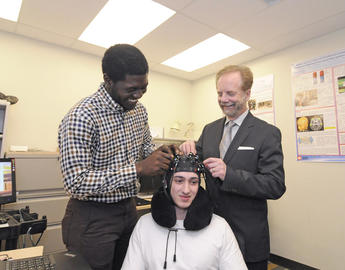What is a Concussion?
A concussion is a type of brain injury, most often caused by a hit to the head, neck, face, or body. They cause changes in how the brain works but these changes can’t always be seen on a CT scan or MRI. A concussion can change the way you think and feel. Symptoms can vary and present differently depending on the person and injury.
If you would like to contribute to further research on causes and treatments of concussion, please visit our donation page.
The university's Integrated Concussion Research Program works with the Alberta Children’s Hospital Research Institute and the Hotchkiss Brain Institute in the Cumming School of Medicine, the Faculty of Kinesiology, and the Department of Psychology in the Faculty of Arts to address concussion and other forms of mild traumatic brain injury.
Quick Facts

Research Highlights
- Concussion Burden, Recovery, and Risk Factors in Elite Youth Ice Hockey Players
This study examines the prevalence of concussion in elite youth hockey players. Read the full study in the Clinical Journal of Sports Medicine here. - Characterizing Physical Activity and Sedentary Behavior in Adults With Persistent Postconcussive Symptoms After Mild Traumatic Brain Injury
This study evaluates physical activity and sedentary behavior and their associations with symptoms and quality of life outcomes in adults with persistent postconcussive symptoms after mild traumatic brain injury. Read more in the Archives of Physical Medicine and Rehabilitation here. - Treatment of Persistent Post-Traumatic Headache and Post-Concussion Symptoms Using Repetitive Transcranial Magnetic Stimulation: A Pilot, Double-Blind, Randomized Controlled Trial
This study evaluated headache characteristics at 1-month after repetitive transcranial magnetic stimulation (rTMS) treatment in participants with post-traumatic headache and persistant postconcussion symptoms. Read more in the Journal of Neurotrauma here.








